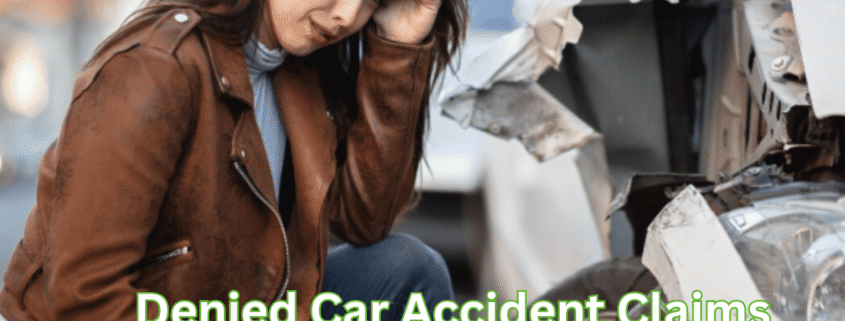What to Do If Your Utah Car Accident Claim Gets Denied?
A denied insurance claim adds stress when you are already coping with injury, bills, and lost time. In Utah, denials happen for many reasons. It includes missing paperwork, coverage limits, disputed fault, or unclear medical links to the crash. The steps you take right after a denial matters. You do not have to accept a short check or confusing explanation.
This guide walks through how insurers review claims, what evidence matters, how to appeal inside the company, when to involve the Utah Insurance Department, and when it makes sense to hire help. We are going to explain this topic in easy to understand language. So, you can act with confidence and protect your right to fair compensation.
Essential Information You Need to Know:
- Read the denial letter for the exact reason.
- Save all medical records and bills.
- Track every call and every new document.
- Do not sign away future claims quickly.
- Follow the insurer’s appeal steps fast.
- File a complaint with the Utah Insurance Department.
- Keep an eye on Utah filing deadlines.
- Talk to a local lawyer early.
Why do insurance companies deny car crash claims?
Insurers deny claims for simple mistakes and for big questions. Sometimes a form was not filled out, a deadline was missed, or the person listed on the policy was not the one hurt. Other times the insurer says your injuries predate the crash or the treatment began too late to link it to the accident.
Adjusters also compare the police report, body shop estimates, and medical notes to decide what to pay. If a video, social post, or witness statement seems to contradict your claim, the insurer may deny or lower the payment. A denial is often a starting point, not an end. You should ask for the written reason. Because the exact phrase will guide your next move.
If the denial says fraud or deception, you should get legal help right once. Adding a doctor’s note, missed paperwork, or a clear timetable will fix the problem for many denials. Keep calm, collect proof, and do the small fixes first. If the company still refuses, you have the right to appeal inside the insurer and to take complaints to the Utah Insurance Department.
Evidence insurers want and how they read it
Adjusters build a file. They want the police report, photos of the vehicles and scene, repair estimates, and medical records that tie the injury to the crash. They check emergency room notes, doctor visit summaries, imaging, and therapy reports. Dates matter. If your treatment starts the same day or within a short window after the crash, that helps your case.
Large gaps in care or sudden new complaints months later make a claim look weaker to an insurer. Be careful with recorded statements. Insurers use those recordings to spot inconsistencies. You have the option to decline a recorded statement until you have obtained medical records and legal counsel.
If needed, an independent medical exam or a treating doctor’s short letter linking the injury to the crash can change an adjuster’s view. Arrange your records by date and provide a comprehensive timeline of symptoms and treatment. That makes it easier for someone reviewing the file to see the connection between the crash and your losses.
Steps to take the moment your claim is denied
First, save the denial letter and circle the denial reason. Note the date you received it. If the insurer says you missed paperwork. Then collect that documentation now and send it with a short cover letter. Use a certified mail or an email address to ensure that you have proof of delivery.
If they say you reported the crash too late, get any texts, emails, or the police report with timestamps that show you did so right away. Do not accept a small paycheck that includes a full release unless you are certain it covers everything. Signing a broad release can close your right to further payments. Keep a call log for every person you speak with at the insurer: name, title, date, and short notes.
Talk to your medical providers about a short letter linking care to the crash; many providers will write a concise statement for appeals. If bills are due and you cannot wait, explain the situation to medical billing offices and ask for a payment plan while you sort the claim.
Finally, if you feel overwhelmed or the insurer claims fraud, reach out for a legal review from a local lawyer experienced with car crashes in Utah. Acting fast keeps options open and protects deadlines.
How to file an appeal and use the Utah Insurance Department?
Your denial letter should explain the insurer’s internal appeal steps. Follow those rules exactly and meet any deadlines. Write a clear appeal letter that states why the denial is wrong. Also, attach the missing records and include a short timeline of events.
Research with the insurer to reevaluate the file in light of the new documents. If your appeal is denied again due to any reason, request the claim file and any recorded statements used to reach the decision. You can then submit a formal complaint to the Utah Insurance Department.
The department reviews whether the company followed the law and can investigate unfair practices. Use the state complaint form and include copies of your appeal, denial letter, and supporting documents.
The Utah Insurance Department also provides tips and can explain if independent review options apply for certain health denials. Keep copies of every submission and take note of contact names at the department. Filing a complaint does not replace a lawsuit, but it can pressure the insurer and sometimes lead to a better result without court. For details on filing and contact information, see the Utah Insurance Department consumer pages.
Timing and deadlines: Utah limits and why do they matter?
Deadlines matter in insurance and in court. Internally, insurers set appeal windows you must meet to keep rights to review. A time limit is imposed by Utah law on filings that occur outside of the company. For most car crash cases, you have four years from the date of the crash to start a lawsuit under Utah Code.
Even when you are in the midst of an appeal, that clock continues to operate. The Utah high-court can also dismiss your case. Then you can forfeit the opportunity to recover damages if you delay beyond the statute of limitations. There are narrow exceptions. They can change the deadline, so do not assume the timeline is the same for every case.
If the insurer’s denial points to coverage disputes such as uninsured or underinsured motorist coverage, Utah law has specific rules and terms that can affect how and when you file a claim. If you are unsure about deadlines, get a quick legal check. Early review from a local lawyer keeps options open and prevents surprise dismissals later on.
Contact the best car accident injury Lawyer in Utah – Chris Cockayne
When the insurer will not budge, a lawyer levels the playing field. A local personal injury lawyer Utah knows how adjusters think and what judges expect in this state. Chris Cockayne and his team at Cockayne Law focus on auto crashes and injury claims.
They collect missing records, speak with treating doctors, preserve evidence, and handle all contact with the insurer. A lawyer can ask for the full claim file, point out legal errors in the denial, and prepare a case for court if needed.
Many firms work on contingency, meaning you pay only if they recover money for you. That removes pressure to accept a low offer out of fear of bills. A lawyer will tell you if you should file a complaint with the Utah Insurance Department and if the matter should go to court if the insurance company utilized unfair methods.
Conclusion
Just because your claim was denied doesn’t mean you’ve lost it. Read the refusal carefully. Collect some proofs that are missing. Then follow the steps the insurer gives you to appeal. Keep a comprehensive timeline, medical records, bills, and pictures. Check Utah’s four-year rule for most injury cases to be sure you meet your deadlines. Don’t wait for fees to mount up. If the insurance company says you committed fraud or won’t give you a fair evaluation, submit a complaint with the Utah Insurance Department and think about getting legal counsel.
FAQs
Why was my claim for insurance turned down?
Insurance companies turn down claims for missing forms, late reports, gaps in care, coverage limits, or disagreements over who caused the incident. Begin by reading the denial and getting the records that the insurance company says it requires.
How long do you have to wait to sue after a vehicle accident in Utah?
The Utah state code says that you have four years from the date of the crash to file a lawsuit for most vehicle crash injuries. Talk to a lawyer about any exclusions and the specific time.
Can social media hurt my claim?
Yes. Photos or posts that show activity contrary to your injury statements can be used by adjusters to deny or reduce payment. Avoid posting about your injury or activities while a claim is open.
How can I show that I’m in pain?
Write down your symptoms and how your life altered in a short journal every day. Combine this with medical notes, therapist reports, and statements from family about your limits. Organized evidence helps show nonmedical losses.









